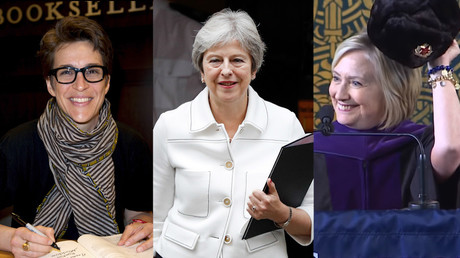Why is paid Integrity Initiative hitman Ben Nimmo still used as ‘independent’ expert by MSM?
Unlike ‘Russian troll-hunter’ Ben Nimmo, we do not wish to silence voices we disagree with. But it would be a step forward if Western media didn’t present him – or his ilk – as impartial authorities, or let them shape Russia news.
British-born Nimmo’s latest media appearance is in the recent Sunday Times article that names and shames Sputnik radio journalists working at its Edinburgh bureau, and discusses their role in “amplifying” last month’s leaks from the Institute of Statecraft. The latter is the body that oversaw Integrity Initiative, the covert Foreign Office-funded psyops outfit engaged in anti-Kremlin activities worldwide.
Also on rt.com The Times names & shames Sputnik journalists in appalling McCarthyist hit-piece
Wheeled out to comment was a non-specific “defence analyst” by the name of Ben Nimmo, who duly declared that Sputnik is “an instrument of Russian state power, not an independent journalism outlet.”
One fact that wasn’t mentioned – Nimmo is himself a senior fellow at the Institute of Statecraft. This isn’t some secret information obtained from a hack, but is proudly written in Nimmo’s bio on the site of the NATO-affiliated Atlantic Council, his chief place of employment.
So, not only does Nimmo have an undeclared agenda, but the (partial) subject of the story is allowed to comment on it as an outside authority. This would be akin to writing an article about the judicial case against Donald Trump, then asking “legal expert” Rudy Guiliani to weigh in on its validity. Not even the most unethical reporter (and make no mistake, this is a punishable breach of journalistic ethics at most media outlets) would dare insult the intelligence of their audience like this, unless the story is about Russia, that is.
What adds comic neatness to the contretemps is that Integrity Initiative has just been outed doing exactly this: using friendly (or sufficiently remunerated) voices to publish politically-motivated articles in mainstream media outlets, under the guise of respectable journalism.
Taken on his word
This is not a one-off occurrence, either. For example, earlier this year, Nimmo was titled “an expert on Russian disinformation” in the very same newspaper, in an article penned by the Times Defence Editor Deborah Haynes. Not surprisingly, she is another name listed on the Integrity Initiative’s list of trusted contacts.
There are other examples like this, though most often Nimmo is simply called an Atlantic Council researcher, without the readers being any the wiser that they are dealing with a NATO department by another name. In fact, Nimmo was a NATO press officer before taking up his current post.
Nimmo’s image is further presented as a mix between a bearded, bespectacled academic (he is both) and a Hogwarts teacher, when he is introduced as the information defense fellow at the Digital Forensic Research Lab (yep, still the Atlantic Council, still NATO).
Also on rt.com The Atlantic Council: Experts on the front line of disinformation
Of course, it is not the titles that are important, but rather the fact that if you open any article published by a mainstream media outlet in the past year, is there any attempt to contextualize or question either the credibility or impartiality of Nimmo himself, or what he has to say.
And by God, does Nimmo have a lot to say.
In the past month alone, he has told BBC that Russian-made memes are “disinformation for the information age”, ABC that “Instagram is ‘tailor-made for hashtag propaganda’”, the Guardian that Nigel Farage is “phenomenally useful for the Russian government” (Hi, Carol Cadwalladr!) and pontificated in Politico about the dangers of “the internationalization of nationalism.”
Occasionally, Nimmo gets ahead of himself, such as when he publicly defamed two Twitter users as “Kremlin trolls” only for them to show their (distinctly non-Russian) faces.
For the most part, however, his views are treated as irrefutable prima facie evidence, providing not just the support but the backbone of entire articles. How did it happen that a 46-year-old man who came to public attention as a scuba-diving, trombone-playing travel writer (yes, really) and appears to have no more expert qualifications than a run-of-the mill journalist or PR staffer, became a conduit for the voice of the divine? And this is without mentioning him being a bona fide FCO-paid intelligence asset.
Let him talk
None of this makes his opinion invalid in itself. While Nimmo, never big on self-awareness, gloats about the possibility of RT being sanctioned by UK media watchdog for impartiality violations in his latest blog, we believe he should be able to continue being his quotable self on almost any subject concerning Russia or the internet. After all, that’s all part of his supposed £2,500-a-month Integrity Initiative retainer (plus however much he receives from the Atlantic Council), and it is quite possible he himself believes every word he says.
The responsibility rests with the media to place a disclaimer every time Nimmo is quoted – as they do at fastidious length every time they cite a Russian-based source – if not for the sake of some higher truth, then at least for their readers, who might actually take him seriously. Or maybe consider occasionally asking someone who is not a professional Russophobe to discuss Russia?
Worst of all, for all his prominence, Nimmo is just one example. His name in this story could be swapped out for dozens of others, who play the exact same role. It is also perhaps a little quixotic to ask for less tendentious quotes, when there are entire intelligence-directed media campaigns likely unfolding before our very eyes. But it would be a good start.
Subscribe to RT newsletter to get stories the mainstream media won’t tell you.






Comments are closed.